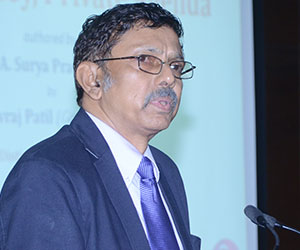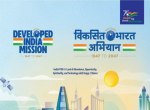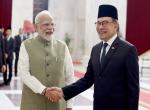The strong and adverse reaction of national political parties to the recent order of the Central Information Commission (CIC) bringing them within the purview of the Right to Information Act (RTI) has provided proof, if proof was needed, that most of them are averse to transparency and accountability in regard to collection of funds, allotment of party tickets and such other intra-party issues. But the biggest disappointment is that the Bharatiya Janata Party (BJP) and the two Communist parties are sailing along with the Congress Party which is currently reeling under a series of scams.
Sadly, the Congress Party, which is the country’s oldest political party, is leading the charge against the CIC. It has dubbed the CIC’s order as “adventurist” and even claimed, by some strange logic, that the order demanding transparency in the working of political parties would “harm democratic institutions” because it would encroach upon the “privacy” of political parties.
The BJP, which initially seemed to welcome the order changed its mind a day later and claimed that the order did not provide clarity on many issues and that there would be an overlap in the roles of the Election Commission and CIC. The Communist Party of India (Marxist) also termed the order as unacceptable. The Janata Dal (United) said that it was “totally opposed” to the move.
During the hearings, the Communist Party of India (CPI) was the only party which had welcomed transparency in the funding of political parties. But even the CPI began speaking with a forked tongue after the CIC passed the order. Its National Secretary Mr.D.Raja described the order as “disputable”. One thing is clear from the reactions of the political class to the order – they will all gang-up and do everything in their power to prevent the public from knowing how much funds they raise and where they get their funds from. Are they justified in practicing such opacity? The Congress General Secretary, Mr.Janardhan Dwivedi claims that the CIC order will affect the privacy of political parties. The full implication of this statement will sink in when you realise that the source of 80 per cent of the funds obtained by political parties is dubious and not disclosed by them to the Election Commission.
The Non-Response of Political Parties
The issue was first raised by Mr.Anil Bairwal of the Association of Democratic Rights (ADR). He filed an RTI application in October, 2010 and sought information from six political parties – the Congress, the BJP, the Bahujan Samaj Party (BSP), the CPI, the CPI (M) and the Nationalist Congress Party (NCP) which are classified as national by the Election Commission. He asked them to furnish the sources of the ten maximum voluntary contributions received by them between 2004-05 and 2009-10 and the mode of payment. He also sought the names and addresses of voluntary donors who had contributed more than Rs one lakh during this period. The Congress Party declined information and said it did not come under the purview of the RTI. The NCP said it did not have the staff to respond to such “unusual” queries. The BJP, BSP and CPI (M) did not respond. The CPI was the only party which furnished information on the top ten donors. Mr.S.C.Agrawal filed another RTI application with the Congress Party and the Bharatiya Janata Party in May, 2011 and sought information on promises made in their manifestoes, promises fulfilled, list of donors to these parties and mode of payment and whether party legislators have to compulsorily contribute to the party fund. Both the parties declined to respond to the queries on the ground that they were outside the purview of the RTI.
The RTI applicants then filed complaints before the Central Information Commission and sought a direction to the political parties to disclose the information they had asked for as all these parties were “public authorities” and came within the ambit of Section 2(h) of the RTI Act and therefore, they were mandated to disclose full information. In view of complexity of the issues raised, the Chief Information Commissioner constituted a full bench of the Commission comprising Mr.Satyananda Mishra, Chief Information Commissioner; Ms.Annapurna Dixit and Mr.M.L. Sharma, Information Commissioners, to hear these petitions.
The petitioners argued that political parties were “public authorities” as stipulated in the RTI Act because of the following reasons: They had constitutional status under the Tenth Schedule; they had the power to disqualify legislators from Parliament and state assemblies and bind legislators to party positions and voting inside legislative chambers; and they had statutory powers under the Representation of People Act, 1951; they made and un-made governments at the Centre and in the states. Further, there were other strong reasons as well. They were “substantially financed” by the government in multiple ways including allocation of land and buildings at concessional rates; income tax exemption on all the monies they collect; free air time on All India Radio and Doordarshan; and two free copies of electoral rolls for every constituency. All these subsidies clearly turned political parties into entities which were “substantially financed” by the government. Once this was established, they would automatically come within the ambit of the RTI.
Mr.Bairwal showed how “transparent” political parties were at the moment. He said all political parties claim to work for the people and in the national interest. But the Income Tax returns of political parties obtained by his organization using the RTI Act revealed that on an average only about 20 per cent of the income of political parties came from donations that they disclose to the Election Commission under the Representation of People Act. “The sources of the remaining 80 per cent of the income are shrouded in mystery. This is what gives rise to all kinds of speculation about the pernicious influence of illegal money”.
Political Parties Are “Substantially Funded” by the Government
Since bodies or institutions which are “substantially financed by the government” come within the ambit of the RTI Act, the petitioners produced clinching evidence to establish this fact. Anil Bairwal presented tables showing benefits obtained by the six national parties under various heads. He showed that for three years from 2006-07, the Congress Party had availed of income tax exemption of Rs 300 crores whereas the BJP had availed exemption of Rs 141 crores. The BSP had got tax exemption of close to Rs 40 crores and the CPI(M) of Rs 18 crores. The cost of the air time given by All India Radio to the six national parties was Rs 28.56 lakhs during the Lok Sabha election in 2009 whereas the cost of the time allotted to these parties by Doordarshan during that election was Rs 10.75 crores.
But the real “funding” of political parties by government comes via the real estate route. In the New Delhi area dozens of bungalows are rented out to political parties like 24, Akbar Road and 11, Ashoka Road, the headquarters of the Congress and the BJP. All major parties have similar allotments of rental accommodation. All these bungalows are given at ridiculously low rent to these parties. However, the real estate in the possession of political parties does not end here. Apart from these bungalows, the government, at various times, has allocated prime plots in Lutyen’s Delhi to political parties at throwaway prices. Mr.Bairwal calculated the current market value of these valuable plots of land as follows: the Congress Party - Rs 1036 crores; BJP – Rs 557 crores; CPI(M) – Rs 241crores; CPI – Rs 78 crores; Rashtriya Janata Dal – Rs123 crores, Samajwadi Party -261 crores; JD(U) – Rs129 crores. The total current value of plots allotted to political parties by the government in Delhi is Rs 2556 crores.
Finally, Mr.Bairwal argued that there was need for accountability and transparency in the functioning of the political parties and this had been emphasized by the Law Commission of India in its 170th Report on Reform of Electoral Law. The commission had said: “On the parity of the above reasoning, it must be said that if democracy and accountability constitute the core of our constitutional system, the same concepts must also apply to and bind the Political Parties which are integral to parliamentary democracy. It is the Political Parties that form the Government, man the Parliament and run the governance of the country. It is therefore, necessary to introduce internal democracy, financial transparency and accountability in the working of the Political Parties. A political party which does not respect democratic principles in its internal working cannot be expected to respect those principles in the governance of the country. It cannot be dictatorship internally and democratic in its functioning outside”.
In view of the arguments advanced by the complainants, the commission wrote to all the national political parties to elicit their views on the issues raised. How much respect our political parties have for national institutions and institutions created by law by parliament can be gauged from the fact that all the main parties ignored the letter sent by the commission. They neither had the courtesy nor the gumption to respond to the CIC’s queries.
After hearing the parties, the CIC listed the following legal and constitutional facts, which it said, clearly emerged from the evidence at hand: That the political parties are the building blocks of a constitutional democracy; that under Tenth Schedule of the Constitution, a political party can have a Member of the House disqualified in certain circumstances; that a political party is required to be registered by the Election Commission of India under section 29A of the Representation of People Act, 1951; that under section 29C of the RP Act, 1951, a political party is required to submit a report for each Financial Year to the Election Commission of India in respect of contributions received by it in excess of 20,000/- rupees from any person as also contributions in excess of 20,000/- rupees received from non-Government companies; that in exercise of its powers under Article 324 read with section 29A of the RP Act, 1951 , and rules 5 & 10 of the Conduct of Election Rules, 1961, the Election Commission has issued Election Symbols(Reservation & Allotment) Order, 1968, under which election symbols are allotted to various National/State political parties; that Election Commission can suspend or withdraw recognition of a recognized political party in the event of violation of provisions of Election Symbol (Reservation & Allotment) Order, 1968; that Central Information Commission’s order dated 29.4.2008 directing the Political Parties to disclose their Income Tax Returns holds the field and is being complied with.
On the financial side, the following facts had to be taken note of:
(a) that the Land & Development Office of the Ministry of Urban Development has allotted large tracts of land in Delhi to various political parties either free of cost or at concessional rates;
(b) that the Directorate of Estates, Ministry of Urban Development, has allotted accommodation in Delhi to various political parties on rental basis at concessional rates;
(c) that political parties have been claiming and granted total tax exemption under section 13A of the Income Tax Act for all their income;
(d) that the State has been indirectly financing political parties by way of free air time on All India Radio and Doordarshan of India during the elections; &
(e) that recognized political parties are issued copies of electoral rolls by the Election Commission, free of cost at the time of elections.
CIC Says Land Allotted to Political Parties at “Hugely Concessional Rates”
The commission dwelt on the real estate gifted to political parties by the government and said that even allowing for a margin of error in the estimation of the value of land allotted to various political parties by Mr.Bairwal, “we have reasons to believe that this land has been allotted at hugely concessional rates. The lease value of these properties in the open market has not been placed before us. Even so, we strongly believe that the premium and the lease rent being charged from the political parties does not reflect the true value of these properties. This, in our considered opinion, amounts to indirect financing and when added to the income tax exemption enjoyed by these political parties, it would amount to substantial financing”. Further, the Commission said that the complainants have provided information in regard to the lands allotted in Delhi by the central government. “We are informed that such allotments have also been made at the state capitals by the state governments. If so, this only reinforces the complainants’ contention that the appropriate governments have indirectly financed political parties in a big way”.
The commission said thirty per cent of their income which these political parties would have otherwise paid by way of income tax has been given up buy the government. This too amounted to “substantial financing, though indirectly” of political parties by the government. Added to this was the concessional allotment of land and buildings in prime locations in the national capital and probably in several state headquarters, if not at the district level also and with this the total amount of direct and indirect financing/funding of these political parties became “considerable”. The free air time on All India Radio and Doordharshan had to be added to this list, the commission said. “In view of the above, we are of the considered opinion that central government has contributed significantly to the indirect financing of Political Parties in-question”.
In view of the above, the CIC concluded that the six national political parties fell into the category of “public authority” as defined in section 2(h) of the RTI.
It said that “the preamble to the Constitution of India aims at securing to all its citizens: JUSTICE, social, economic and political; LIBERTY of thought, expression, belief, faith and worship; and, EQUALITY of status and of opportunity. Coincidentally, the preamble of RTI Act also aims to promote these principles in the form of transparency and accountability in the working of the every public authority. It also aims to create an ‘informed citizenry’ and to contain corruption and to hold government and their instrumentalities accountable to the governed. Needless to say, political parties are important political institutions and can play a critical role in heralding transparency in public life. Political parties continuously perform public functions which define parameters of governance and socio-economic development in the country”. Therefore, they came within the ambit of the RTI Act.
The CIC noted that the National Commission to Review the Working of the Constitution had recommended that political parties as well as individual candidates be made subject to a proper statutory audit of the amounts they spend. In Common Cause Vs. Union of India (AIR 1996 SC 3081), the Supreme Court has dealt with the income and expenditure incurred by the political parties and has laid emphasis on transparency on election funding. The Commission said “The people of India must know the source of expenditure incurred by political parties and by the candidates in the process of election. These judicial pronouncements unmistakably commend progressively higher level of transparency in the functioning of political parties in general and their funding in particular”.
In view of the above, the CIC upheld the contention of the petitioners and said that the Congress Party, BJP, CPI(M), CPI, NCP and BSP have been substantially financed by the central government under section 2(h)(ii) of the RTI Act. “The criticality of the role being played by these political parties in our democratic set up and the nature of duties performed by them also point towards their public character, bringing them in the ambit of section 2(h). The constitutional and legal provisions discussed herein above also point towards their character as public authorities”, the Commission said.
Published Date: 5th July 2013, Image Source: http://i.ndtvimg.com










Post new comment